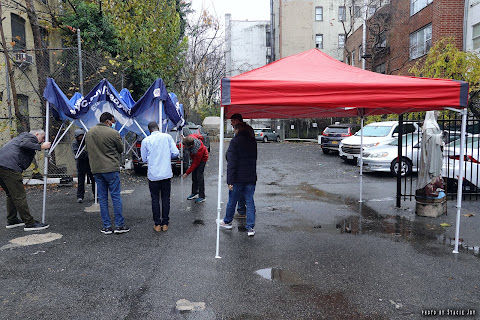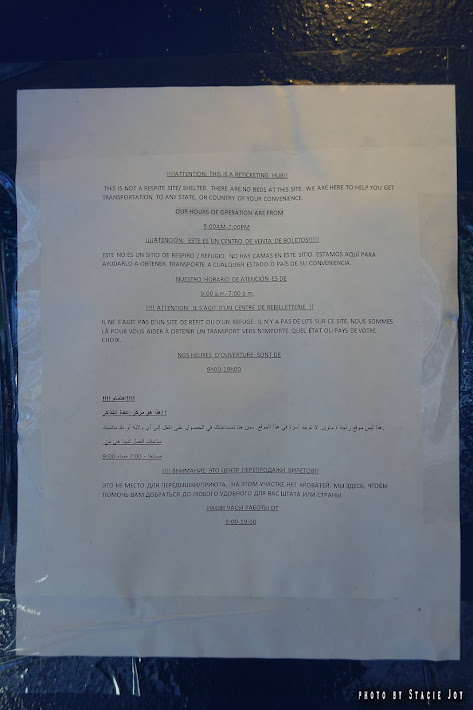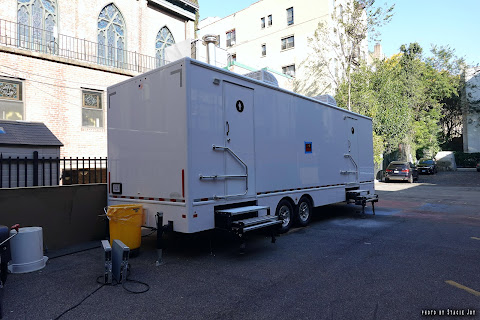The Challenges
As Vox
pointed out, the crisis has deep roots. "The United States' immigration system has long been broken, amplifying an international humanitarian crisis, and the movement of migrants from the southern border into cities has highlighted and tested the system's many fault lines."
In NYC, a
report from the Mayor's Office blamed a host of factors for the current crisis, including the lack of comprehensive federal immigration reform, Trump administration policies and overwhelmed immigration courts.
More than 100,000 migrants have arrived in the city over the last year.
There are thousands of people maneuvering for a cot assignment or shelter location, with more arriving every day.
After the Mayor’s 30-day and 60-day eviction notices went into effect late last year, more and more people have been pouring into the St Brigid's reticketing agency. (The city put the 30- and 60-day limits in place to free up shelter space, though some critics have said the policy is only causing more chaos.)
Women, children, and families are prioritized, so you will see mostly men at this center, although some women are in the line. This site, open only during the day (that is, no one can stay overnight, doors close at 7 p.m., and the site is locked up by 9 p.m.), process those looking for one of the few spaces available.
Some people return daily until a space opens up for them at a shelter or humanitarian relief center. People can also accept a free one-way ticket almost anywhere in the world. Right now, there are White House restrictions on Venezuela, but almost anywhere else is fair game. However, very few people select this option.
If there's space, people can be sent to large sites like the cargo warehouse (Building 197) at JFK lined with cots or wait for a shelter or hotel space to become available. Since there are so few spaces, most people go to Bathgate in the Bronx, where they can sleep on the floor overnight. If there is a Code Blue weather emergency, the former Police Academy center on 20th Street in Gramercy Park will open, and people can stay in chairs overnight.
People are hungry and need more clothing and supplies. The city does provide meals, or at least food, but often,
as we have seen, the food is moldy, expired, or not in accordance with Halal dietary restrictions.
On Saturday, those at the site received a plastic container with a hardboiled egg, a piece of bread with butter/jelly, and an orange.
After being strung along for months, EV Loves NYC cannot provide the meals needed. They depend on community contributions and are a 501(c)(3) nonprofit
. We encourage residents to donate to groups like this that feed all people in need, as they are boots on the ground and have the volunteers, resources, and know-how to continue to provide support on a shoestring budget.
The Site
The former St. Brigid Scho
ol, which closed in the spring of 2019, is overflowing with people and operating way above capacity. Thousands of people are processed here, and the building's infrastructure and staff can't handle the influx.
Staff from NYC Emergency Management, teams from MedRite and security companies like Arrow and Mulligan, have difficulties every day with fights (
cutting the line is a significant problem), sick individuals, and the endless flow of paperwork, translation services, and trying to cope with clearly desperate people who don't have any housing, food, clothing, personal care items or other necessary resources.
Getting work papers is almost impossible, so people work off the books or depend on governmental or community support. Site staff also have to deal with law enforcement and community members who are angry/upset and trying to help.
The site cannot legally accept assistance from the community due to restrictions and risk-assessment issues like bedbugs, space, and the possibility of contaminated food.
City Services, Including the Parks Department and Sanitation
The additional work with the influx of people waiting in the park has caused stress. Workloads have trebled, and mitigating the trash and keeping the park clean has been tremendously difficult.
Law Enforcement
Police officials are fielding calls every day from angry residents about the asylum seekers. Complaints range from line-jumping fights (a daily, often hourly occurrence) to residents upset about men hanging out in or near the playgrounds along Avenue B in Tompkins Square Park.
Some residents are also upset about the hundreds of refugees clogging the park, often sleeping in the area and urinating and defecating in public, a situation made worse after the
city inexplicably removed the three porta potties — the park's only toilets — last Tuesday.
There have been incidents of violence reported inside the school and in the surrounding areas.
New 9th Precinct Commanding Office Pam Jeronimo has made a concerted effort to have officers fluent in Wolof, Pulaar, and Arabic (as well as Spanish) on-site to assist in communication efforts.
The Church
The Archdiocese leases the space at the school to the city for the reticketing site (formerly a HERRC). Rentals are usually on a six- or nine-month time frame. The church administrator, Father Seán Connolly, has no authority or oversight over the city's use of the space and has also expressed frustration with being unable to do more. He has participated in distributions and opened his doors for clothing drives.
Ultimately, he says, he's "a steward of the space."
Interfaith Coalition
The neighborhood has an interfaith coalition of organizations, including representatives from Trinity Lower East Side, Middle Church, Graffiti Church, Hope Church and St. Brigid's/Most Holy Redeemer. They often participate in distributions and the sorting and storing of supplies. The
community fridge outside Trinity on the corner of Ninth Street and Avenue B is a good spot for wrapped, labeled food donations for anyone needing a meal.
Local Restaurants
Multiple local businesses, including C&B Cafe, Spice Brothers, 7th Street Burger, Café Mogador, Veselka, Cafe Chrystie, and others, have provided food, meals, snacks, and supplies for asylum seekers. Some work directly with kind-hearted and dedicated neighbors who hand out the food; others work with mutual aid groups like EV Loves NYC to provide bulk supplies (such as Halal meat).
Local Elected Officials
State Assemblymember Harvey Epstein has attempted to distribute coats the office on the SE corner of Seventh Street and Avenue B received during recent drives but has been stymied by the number of people and the mob scene that ensues.
Because there isn't an organized way to provide coats to the thousand-plus people waiting, these supplies have been going out in smaller, discreet distributions when someone is spotted without proper cold-weather clothing. All coat drive initiatives at this location have been paused.
The City of New York
There is a lack of leadership, money, and any clear path forward from the mayor and his office on down. It is clear that Federal funding is needed, and the city is at a breaking point in trying to manage the massive influx of refugees.
During
a town hall in September, Mayor Adams issued a dire warning: "Never in my life have I had a problem that I did not see an ending to. I don't see an ending to this. I don't see an ending to this. This issue will destroy New York City."
At the same time, there isn't any open communication channel with the Mayor's Office, and talks with NYC Emergency Management have remained ongoing and friendly but ultimately empty, as help has yet to arrive.
Community Members
Many residents have asked us how they can help. We see neighbors bring peanut butter and jelly sandwiches daily, collect money, and buy pizzas to serve, one slice at a time. Pooling cash among friends and relatives to bulk-order items in constant need.
We also see people mobbed by hungry asylum seekers when too many people chase too few goods. It can be scary, and there have been situations that include assault and forcible touching.
Safety concerns exist when one person is doing a distribution, and hundreds of people swarm to receive supplies. There's no easy answer here as cooperation with the site, the city, law enforcement, and the church regarding food and supplies distribution is complicated and time-consuming.
One way people have been having some success is to leave open totes of sweaters, coats, socks, etc., clearly labeled with signs saying Free, Gratis, Gratuit and allowing the asylum seekers to browse for needed items. (It's best to not put the items in garbage bags as they give the appearance of being trash.)
There are very few women in the line, so the overwhelming need is for men's clothing.
Bulk items needed right now include gloves, socks, underwear, scarves and hats. These can be ordered in large numbers, and these items are always needed. They are small, easy to distribute, and less expensive than ordering thousands of winter coats.
There are new people at the site every day. Some people return several days in a row waiting for a new cot assignment, but the need for supplies and food is ongoing. If you are uncomfortable handing out supplies alone, you can do one side-by-side with other distributions.
EV Loves NYC will donate your new bulk-ordered items like gloves, hats, rain ponchos, and underwear. They cannot accept coats and oversized items right now. They are also overwhelmed and have an all-volunteer staff and request patience.
You can watch their
Instagram for planned dates and times going forward. They also work with other aid groups like
NYC Migrant Solidarity and have a planned distribution at the Sixth Street Community Center between Avenue B and Avenue C every Sunday.
[Spanish for "immigration is not easy"]
Postscript
This is a humanitarian crisis with a lot of moving parts. Things are subject to change without advance notice, and often, no one is informed of the new rules until they are underway.
There is a delicate dance of diplomacy and negotiation to get help to the needy without causing further difficulties for staff, residents, and officials — or for the volunteers and asylum seekers themselves.
A lot of frustration is expressed, and people always ask why this issue isn't being addressed. Ultimately, the mayor and the city need a plan going forward, and since there is no end in sight to the flow of refugees being sent here from the southern border, every day brings challenges.
Watching the community come together to help those in need has been heartwarming. Every day, we see asylum seekers using translator apps to express gratitude.
Find the EVG archives with more posts about the asylum seekers
here.

















































